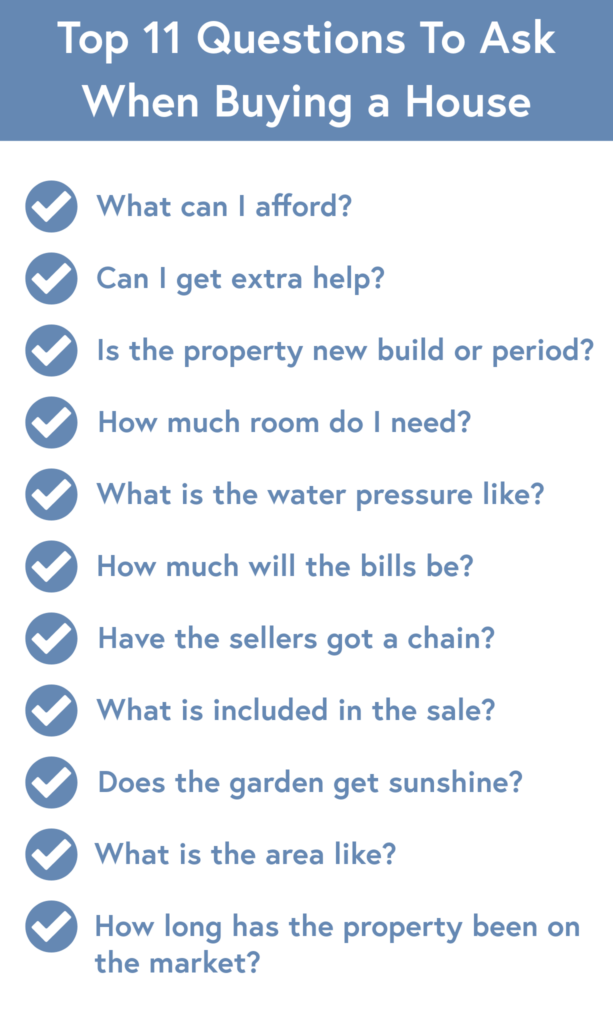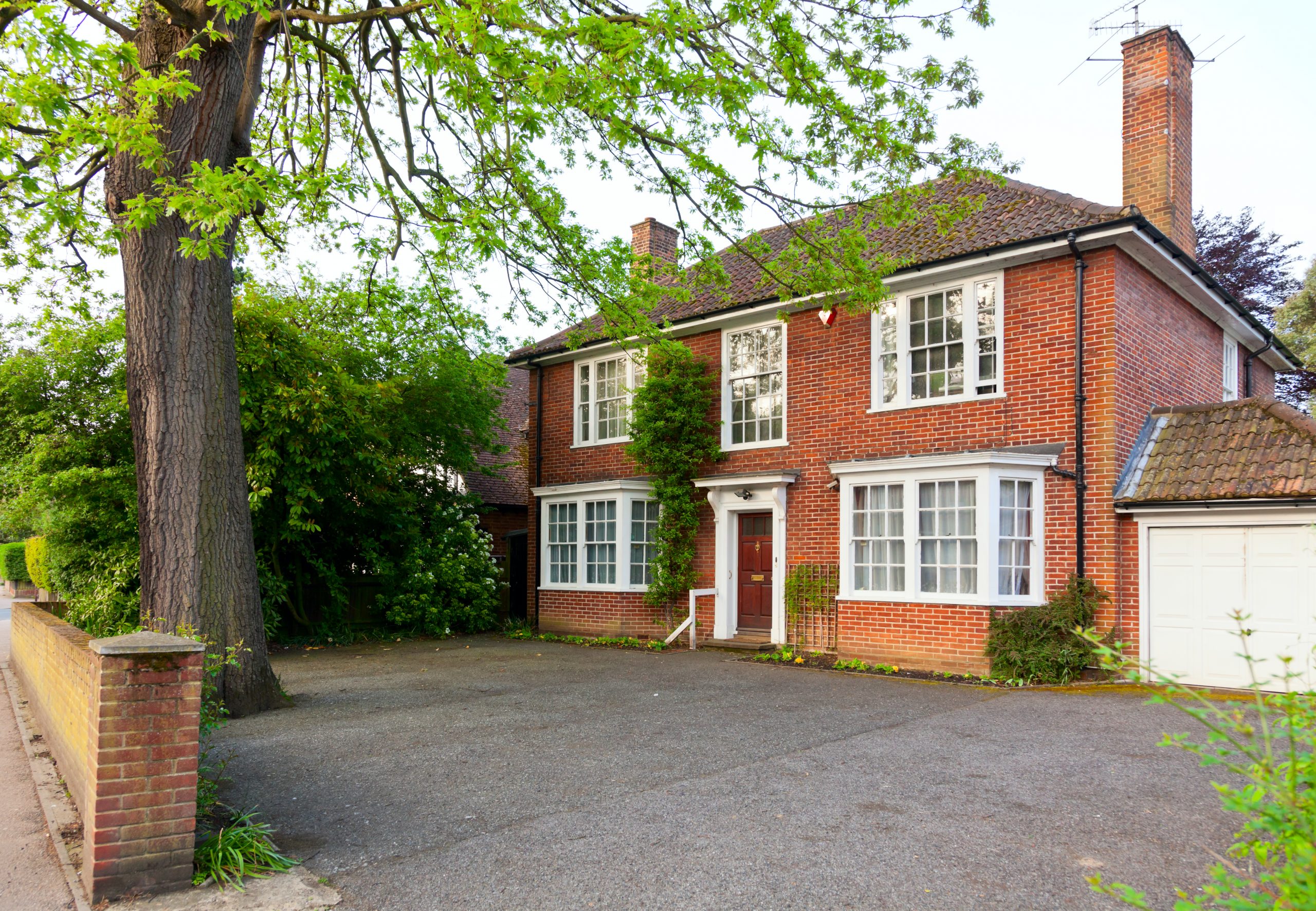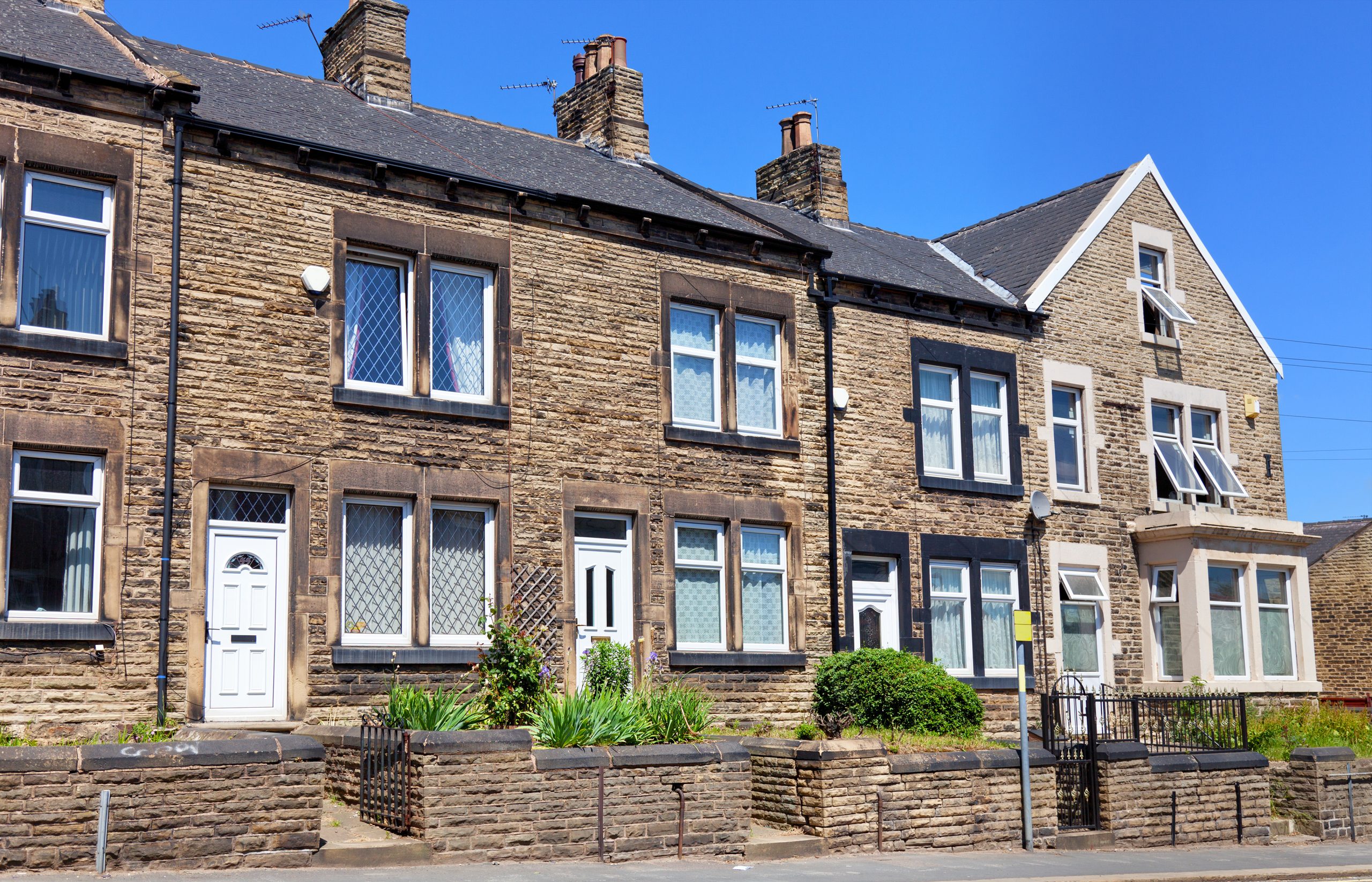Top 11 Questions To Ask When Buying a House

A house or apartment tends to be the most significant purchase that most people will ever make, so it is a process that should be carefully researched and planned, to ensure that the huge financial commitment does not turn out to be a bad decision and a big regret.
Before starting the house buying process, there are a number of significant considerations and questions to reflect upon, to avoid the range of risks you could encounter if you make the wrong decision on any aspect of the house or apartment purchase.
- What can I afford?
- Can I get extra help?
- How long has the property been on the market?
- What is the area like?
- Is the property new build or period?
- How much room do I need?
- What is the water pressure like?
- How much will the bills be?
- Have the sellers found their next property?
- What is included in the sale?
- Does the property get sunshine in the garden?
If you are at the stage where you are thinking about buying a property, these are the key questions you need to consider:
What can I afford?
The first important task is to find out how much you can afford, so that you know what your house price budget is. It is not just a case of working out how much you can afford to pay on a mortgage payment each month, lenders will perform an affordability calculation that will factor in details such as income, regular payments you make and any outstanding debt.
When you are taking out a mortgage, you will generally be required to pay a deposit of at least 5% of the property value. So, when you are calculating how much you can afford, you will also need to factor this cost in. There are likely to be numerous other costs which could include stamp duty, solicitors’ fees, mortgage application fees, moving costs and possibly buying new furniture and appliances.
Therefore, when working out your affordability, you will need to consider all of these additional costs, as well as the cost of home insurance each month, council tax, energy bills, broadband, TV and any other monthly costs you have associated with running a home.
Can I get extra help?
Saving up a deposit can be difficult and can take a long time for many people, but there are some schemes available to help you to get onto the property ladder. Property affordability has been a concern in the UK for some time, which is why the government set up schemes such as the Help to Buy Equity Loan scheme.
With this scheme, if you are able to put 5% off the deposit down on a property, the government will then lend you up to 20% (40% in London) and you apply for a mortgage for the remaining 75% (or less if you put down a bigger deposit). This makes the prospect of buying a property a more realistic option for people who would otherwise not be able to buy their own property.
Another scheme set up to provide financial help for buying a property is Shared Ownership, where the homebuyer owns a percentage of the property and a housing association owns the remainder. Under this scheme, the buyer can own between 25% and 75% of a property and they then pay rent to the housing association on the rest of the value. With most schemes of this type, an arrangement called staircasing will be available, which allows the homeowner to buy the percentage of the property owned by the housing association at some point in the future.
Some mortgage lenders also offer mortgages based on guarantors or a family member paying the deposit, who then get their money returned once a certain number of years of mortgage payments have been made.
Free phone and video consultations are provided in the U.K.
Get StartedHow long has the property been on the market?
One important piece of information is how long the property has been on the market, as this gives you a good idea of whether the property is good value at the asking price. It can also bring your attention to other issues that you might not be aware of. For example, if a property has been on the market for many months, in a time where the property market is performing strongly, this is a red flag.
If other properties in the area are selling faster, then it is likely that there is something about the specific property that is putting buyers off. It could be that the owner is not in a rush to sell and they have put a higher asking price on the property. The property valuation that your mortgage lender will require should ensure that you do not pay more than the property is worth, as that would be a risk to the lender.
What could also be highlighted by a property being on the market a long time is that other people have looked at buying the property but an issue has come up in the survey or the searches that are completed as part of the buying process.
You can ask the estate agent how long the property has been on the market and try to get them to provide further information regarding any issues that have caused problems. You should find that most agents will be upfront about issues, as they don’t want to waste their own time starting the process off with a potential buyer for the sale to fall through when the surveys come back.
If the property has not been on the market for very long and the houses in the area have been selling quickly, this also helps you to work out how much you should put in as your offer. Generally, if a seller is struggling to sell their property, they are more likely to consider a lower offer. Conversely, if houses are getting sold very soon after they are going up for sale, you might need to act quickly before another buyer puts in an offer and you are more likely to have your offer accepted if you go up to the asking price.
What is the area like?
When you are buying a house or apartment, there is a good chance that you will be living in the property for a long time, so you should spend plenty of time researching the local area and making sure you have all of the relevant information that will impact how suitable the area is.
For example, you might be interested to find out the availability of schools and their recent Ofsted results. It is also a good idea to find out what the crime rate is in the area, as well as other key information such as what the transport links and local amenities are like. You can find a lot of this information by doing internet searches but it is also sometimes a good idea to visit the area at different times of day, to see if it is quiet or if there is a pub nearby that causes noise later on at night, for example.
Other issues like noisy roads and train lines could be a bigger problem at night, which is why it is recommended to visit at different times of day. If the property is located near an airport, hospital, fire station or anything else that could lead to regular noise disruption, you will need to consider this too.
You could also ask neighbours questions about the area if you see them when you visit the property. An alternative way to find out residents’ views on an area is to see if there is a local network on Social Media and join it so you can ask questions.
Another useful piece of research is to check whether there are any new housing developments or transport extensions that are planned for the future, as this could impact how much you enjoy living in the area.
Is the property new build or period?
There are benefits to buying new build properties, as well as benefits to buying period properties, so you will need to decide which one is best for you. With a new build property, you have access to the Help to Buy Scheme and you will also have warranties on the property.
With older properties, you are more likely to have to pay for repairs sooner. You might also find that your electrical wiring may need replacing or the roof requires replacing sometime soon. These types of work are essential to keep the property safe and in good condition and they tend to be very expensive, so these details are also very important in your house buying decisions.
The age of the boiler and central heating system is another important factor that could mean you will have a big expenditure in the near future if you need to replace the boiler.
How much room do I need?
You should decide how much room you are going to need and think about whether your space requirements are likely to change in the future. When you start your property search, you will see that you will get less room for your money in areas that are in high demand. For example, buying a studio apartment in a well sought-after area could be more expensive than buying a three-bedroom detached property in a different area.
Therefore, you should give careful consideration to how much room you are going to need, as well as other details such as whether you have much outdoor space, or whether there is loft space to store your belongings in. If you have bulky items that you need to keep on the property, like bikes, or other hobby equipment, then you will need to make sure you have ample room.
Are you likely to have a bigger family in the future or will you work from home and require a home office? You will need to make sure to have enough rooms for these scenarios. If you have a car, you will also have to look at your parking options; whether there is a driveway, garage or allocated parking space.
A common problem with properties that have none of these parking options is that street parking becomes a first come, first to park situation and this can cause friction between neighbours in the street who are all fighting for the limited parking space close to their houses.
What is the water pressure like?
When you check the property over, you should also check the water pressure by turning on the taps and the shower to see whether the water is flowing out quickly. If the pressure is low, this could mean that there is a problem that will require costly repairs, or you will have to put up with a shower that is not very powerful.
How much will the bills be?
As well as paying your mortgage payments each month, you will need to make sure you can afford to pay all of the bills when you move into the property. You need to ask what council tax band the property is in and you should also try to get an idea of how much the gas, electricity and water bills will be. Energy providers will usually be able to predict an amount based on how many occupants and the house type.
See What Our Clients Have To Say
Have the sellers found their next property?
If you are looking to move into the property as soon as possible, you should ask whether the sellers have found the property they are buying, or will you have to wait for them to find it. Getting stuck in a chain of sellers can not only delay your property purchase, it could mean that your house sale falls through.
What is included in the sale?
You also should be clear on what is included in the property sale, as some items that you think are included might actually be excluded, as the owner wants to take them to their new property. For example, blinds, light fittings, or even carpets could be excluded from the sale, so get this information before you put your offer in.
Does the property get sunshine in the garden?
If you enjoy spending time in the sun, then you will ideally want a property where the garden has the sun throughout the day. By checking which way the sun is facing, you will be able to work out whether you will be able to have sunny barbeques or be able to sunbathe on the warmer days.
These are some of the most important questions to consider when you are looking at buying a property. Buying a house is usually a very long-term commitment, so you want to make sure that you do the right research to have the best chance of being happy with your new home and the location.
If you are looking at buying a property, working with a broker such as Boon Brokers will be able to help to find answers for all of the relevant questions that will influence whether it is a good idea to put in an offer for a property. Buying a property without doing adequate research is a big financial risk, so contact us today for expert advice and support on the home buying process.
Gerard BoonB.A. (Hons), CeMAP, CeRER
Gerard is a co-founder and partner of Boon Brokers. Having studied many areas of financial services at the University of Leeds, and following completion of his CeMAP and CeRER qualifications, Gerard has acquired a vast knowledge of the mortgage, insurance and equity release industry.Related Articles
- The House Buying Process
- How Much Deposit For A Mortgage?
- What Is A Mortgage Illustration?
- How Long Does A Mortgage Application Take?
- What Documents Are Needed For A Mortgage?
- The Mortgage Underwriting Process
- Advantages Of A Mortgage Broker
- Fixed Rate Mortgage
- Purchasing A Property With Shared Ownership
- Everything You Need To Know About Buy To Let
- What Is A Deed Of Covenant?
- What Is A 5X Mortgage?










